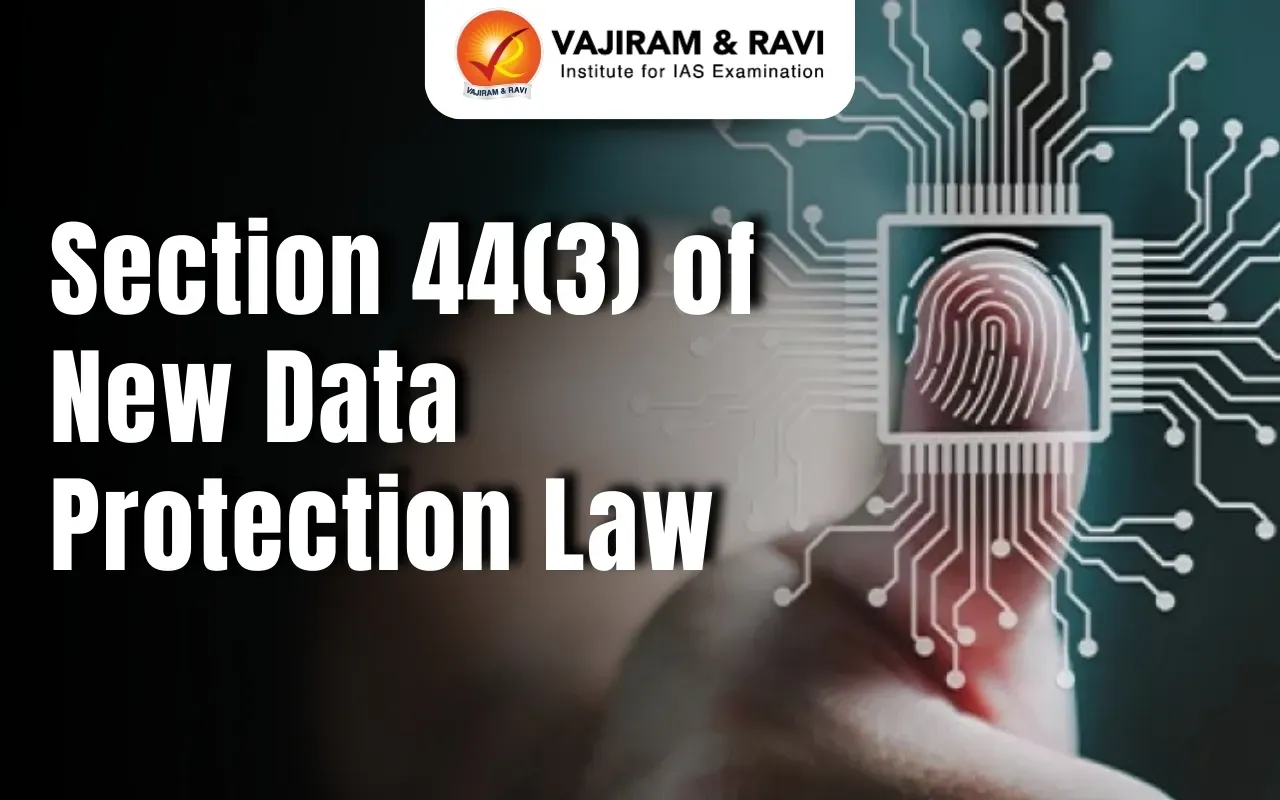Section 44(3) of New Data Protection Law Latest News
Concerns Over Section 44(3) of the Digital Personal Data Protection (DPDP) Act
Why in the News?
- Section 44(3) of the DPDP Act, 2023 has sparked controversy as activists claim it weakens the Right to Information (RTI) Act, 2005.
- Congress leader Jairam Ramesh has urged the Minister of Electronics and Information Technology (MeitY) to repeal this provision, arguing that it would “destroy” the RTI Act.
- RTI activists, including Aruna Roy, Nikhil Dey, Prashant Bhushan, and Anjali Bhardwaj, have opposed the amendment, warning that it could restrict access to critical public information.
What is Section 44(3) of the DPDP Act?
- The DPDP Act, 2023, received Presidential assent on August 11, 2023 and aims to regulate digital personal data processing while balancing individual privacy rights with lawful data processing needs.
- Section 44(3) amends Section 8(1)(j) of the RTI Act, 2005, expanding the scope of denying information under the pretext of protecting personal data.
- The Change:
- Previous Section 8(1)(j) (RTI Act): Allowed exemption from disclosure only if the personal information was unrelated to public interest or caused unwarranted privacy invasion, unless larger public interest justified disclosure.
- Revised Section 8(1)(j) (DPDP Act):This removes the “larger public interest” clause and broadly exempts all personal information from disclosure under RTI.
How Could This Affect RTI Requests?
|
Before DPDP Act (RTI Act – Section 8(1)(j)) |
After DPDP Act (Section 44(3)) |
|
Personal information could be disclosed if public interest justified it. |
All personal information is exempt from disclosure, regardless of public interest. |
|
Example: A citizen could request details of public officials’ assets if corruption was suspected. |
Example: Such a request can now be denied, citing personal data protection. |
|
The balance between privacy and transparency was determined case-by-case. |
Blanket exemption for personal data, even if it concerns public officials. |
Section 44(3) of New Data Protection Law FAQs
Q1. What does Section 44(3) of the Digital Personal Data Protection (DPDP) Act state?
Ans. It allows the government to exempt certain agencies from data protection rules in matters of national security, sovereignty, or public order.
Q2. Why is Section 44(3) controversial?
Ans. Critics argue it gives the government broad powers to bypass data privacy regulations, raising concerns over surveillance.
Q3. How does Section 44(3) impact individual privacy?
Ans. It may weaken personal data protection, as certain agencies can access data without user consent.
Q4. How does this section compare with global data protection laws?
Ans. Countries like the EU (GDPR) have stricter oversight on government exemptions, ensuring privacy rights.
Source: IE
Last updated on November, 2025
→ Check out the latest UPSC Syllabus 2026 here.
→ Join Vajiram & Ravi’s Interview Guidance Programme for expert help to crack your final UPSC stage.
→ UPSC Mains Result 2025 is now out.
→ UPSC Notification 2026 is scheduled to be released on January 14, 2026.
→ UPSC Calendar 2026 is released on 15th May, 2025.
→ The UPSC Vacancy 2025 were released 1129, out of which 979 were for UPSC CSE and remaining 150 are for UPSC IFoS.
→ UPSC Prelims 2026 will be conducted on 24th May, 2026 & UPSC Mains 2026 will be conducted on 21st August 2026.
→ The UPSC Selection Process is of 3 stages-Prelims, Mains and Interview.
→ UPSC Result 2024 is released with latest UPSC Marksheet 2024. Check Now!
→ UPSC Prelims Result 2025 is out now for the CSE held on 25 May 2025.
→ UPSC Toppers List 2024 is released now. Shakti Dubey is UPSC AIR 1 2024 Topper.
→ UPSC Prelims Question Paper 2025 and Unofficial Prelims Answer Key 2025 are available now.
→ UPSC Mains Question Paper 2025 is out for Essay, GS 1, 2, 3 & GS 4.
→ UPSC Mains Indian Language Question Paper 2025 is now out.
→ UPSC Mains Optional Question Paper 2025 is now out.
→ Also check Best IAS Coaching in Delhi

















